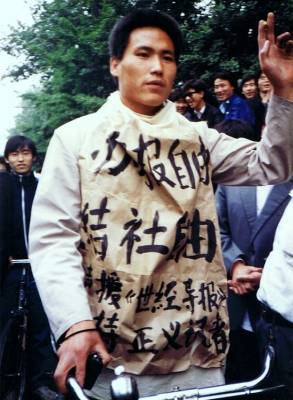 In this edition: anniversaries, LGTB news and news bits from around the globe involving freedom and free speech (leaving out all recent conflicts).
In this edition: anniversaries, LGTB news and news bits from around the globe involving freedom and free speech (leaving out all recent conflicts).
Back after a break due to holidays and revamping the backbone of the site this edition is a bit longer and broader than usual. Let’s start with the anniversaries of events around freedom. There had been plenty over the last few weeks, some of them round anniversaries. Here is a small selection:
The first two relate to the two wars that are commonly called world wars. On June 6th it had been 70 years since d-day. The landing of the allied troops in Normandy was later then many had hopped but when it happened it brought the power needed for the final turn in WWII – leading to the collapse of the Hitler regime and freeing Europe. Without the sacrifices brought back then we could not live in the Europe we live right now.
WWII had its roots for an important part in WWI – which was triggered with the assassination of the Austrian Archduke Franz Ferdinand on June 28, 1914. July 28 brought the 100th anniversary of the start of WWI, 100 years before Austria declared war on Serbia and that triggered various allies on both sides to join.
June brought also the 25th of an event worldwide known as Tiananmen Square crackdown. The heavy handed end to the demonstration at this square in Beijing became symbol for the violence used by the government to end the 1989 democracy movement in China, which started in spring – led by students but with large support by the people. The end came unexpected as in the weeks before the government gave signs of willingness to reform. But at the end even this crackdown had a positive side. It was one in a row of events in several back then socialist countries. Inspired by the glasnost movement that Mikhail Gorbachev initiated, democracy movements gained ground in many countries of the socialist block. The movement in China was not successful, but in many Eastern European countries it was – freeing the people there from the rule of the communist parties.
Another anniversary was on July 1st. On that day the Netherlands commemorate the end of slavery in the country and its former colonies. 151 years ago slavery had been officially abolished – but only 10 years after that people were finally free, as the law included a 10 year period of mandatory work on the plantations. But ending slavery is one thing; coming to terms with this period in history is a different story. It took till last year before the government voiced at least deep regret – but still not an apology. How touchy the issue of slavery still is in the Netherlands can also be seen by the recent discussions around a figure that is part of the yearly Sinterclaas celebration.
The last anniversary leads also to the next topic: the Russian anti-gay-propaganda law is now 1 year in effect in Russia. This law is only one in a series of laws limiting human rights and free speech. Over the last 2 years Putin has slowly moved back to old Soviet times. More on this later this week in a new blog post.
Further LGTB news: On July 1st the Netherlands became the next country where transgender can change their sex in the passport without surgery – making their life and a switch easier.
Unexpected was the news from Mongolia. Currently there is a non-discrimination law under consideration in legislation, targeting hate crimes, especially against LGTB. Far from perfect – but it is progress. And that in a country surrounded by autocratic regimes!
Another surprise came from Uganda. A judge there ruled that parts of the recent anti gay law were unconstitutional. Although it is likely that they’ll find new ways to pass similar measures, this is a relief for now.
Freedom of speech is lately in an increasing number of countries under pressure. One of them is Iran where it came after a quieter period back on the agenda. Despite having elected a relatively moderate president the hawks are back again. Lately eight facebook users got sentenced to jail for up to 20 years for blasphemy and propaganda against the state. Their guilt: being slightly critical on the government on their facebook page.
Six other youths got sentenced to prison after they’d uploading a video where they where dancing on a rooftop in Tehran to the song “Happy” from Pharrell Williams. Reason: their behavior is “a threat to Islamic morals and a violation of Iran's sharia and morality laws”. The women face additional charge for not wearing headscarves.The later – charges for not wearing a headscarf – could also happen to Maryam Mirzakhani, an outstanding mathematician, who recently became the first woman awarded the Fields medal, if she were to return to Iran. Her crime: not wearing a headscarf and “proper” Islamic clothing. But well – that you can face worse condemnations experienced actress Leila Hatami. She got into trouble for a friendly greeting in Cannes where she gave the 83 years old president of the festival, Gilles Jacob, a kiss on his cheek. Hardliners called for her to be flogged and imprisoned.
Egypt moved from spring back to ice age. After getting rid off the autocrat Mubarak a short democratic intermezzo had been tried. Unfortunately a non-democratic party won – and interpreted the democracy the Erdogan way: hey, I’ve a got majority, so I can do whatever I want! Argh, wrong. Besides that this already neglects basic human rights, democracy is about protecting the rights of minorities. By now the situation has been corrected – by an army coup. Right. So Egypt moved back to start: an autocrat, originally from the military and elected in a fake vote. In that picture fit neatly the recent jail sentences for Al Jazeera journalists.
China is also trying to come to turns with the one country, two systems arrangement it agreed to when Hong Kong was handed over by the Brits. Understandably, as it is sort of inconvenient if you tell in the state control media one thing and then people from mainland visiting Hong Kong get completely different news. It sort of undermines all the censorship efforts. So in a recently published white book the Chinese government painted a picture of the future of this system. It would basically result in one country – one system, where Hong Kong would be left with a few decorative but meaningless exceptions. That didn’t go down well in Hong Kong. An online petition quickly had more than 1 million signatures and several hundred thousands populated the streets in protest. The effect remains to be seen but at least is Beijing warned that not everyone is happy with the proposed changes.
 Mixed news was the ruling by the EU commission against Google – the so called right to be forgotten. On one hand it is about time that a discussion takes place about ownership of online content. The person putting it up should have control about it. And it is also time to discuss the abuses (false accusations can destroy a person’s future life) and how legitimate it is that search engines manipulate the results one gets. On the other hand the current ruling and how it is implemented by Google defeats the very idea of free speech. In extreme it opens the door to censorship – by persons, companies and governments. You don’t like what it says online – just fill in the form and it won’t be found by Google anymore, hm …
Mixed news was the ruling by the EU commission against Google – the so called right to be forgotten. On one hand it is about time that a discussion takes place about ownership of online content. The person putting it up should have control about it. And it is also time to discuss the abuses (false accusations can destroy a person’s future life) and how legitimate it is that search engines manipulate the results one gets. On the other hand the current ruling and how it is implemented by Google defeats the very idea of free speech. In extreme it opens the door to censorship – by persons, companies and governments. You don’t like what it says online – just fill in the form and it won’t be found by Google anymore, hm …
With being all over the in the news now it has to be covered also here: the racial issues in the U.S. On May 17th it had been 60 years since the United States Supreme Court ruled in Brown v. Board of Education. This landmark ruling made racial segregation in public schools unconstitutional – a big step towards more racial equality. But that this process is far from finished is painfully visible in the current events in Ferguson – ironically involving again someone named Brown. What is going on there is worth a full blog, so it will come back later on this site. But it’s sad to see how far the way to equality still is and how deep segregation still is rooted in parts of society.
For closure a happier note: Meriam Ibrahim, the Sudanese woman converted from Islam to Christianity, is finally free and safe. She has left the country to start all over again in the U.S.
And one more anniversary to close this edition: on June 23rd the Icelandic parliament celebrated its 1,084th anniversary. Congratulation to the oldest parliament in the world!